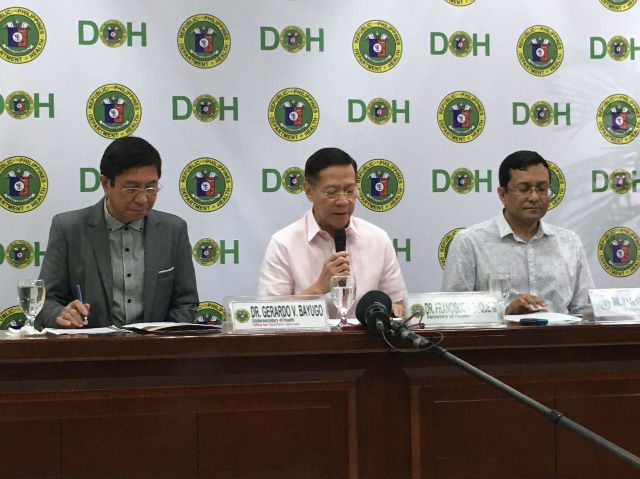SUMMARY
This is AI generated summarization, which may have errors. For context, always refer to the full article.

MANILA, Philippines (UPDATED) – Over 700,000 Filipino children in Luzon have been given the dengue vaccine Dengvaxia under the government’s mass immunization program, the Department of Health (DOH) said on Friday, December 1.
Health Secretary Francisco Duque III released the latest the figure, which is as of November 2017, after Dengvaxia manufacturer Sanofi Pasteur announced that the vaccine poses higher risks to those who got vaccinated without prior infection of the virus.
“As of now, ang nakukuha ng first dose sa Regions 3, 4-A, NCR, umabot ng 733,713 doses or children ages 9 and above. So ‘yan ang pinakahuling datos natin mula November 7, 2017,” said Duque. (READ: Vaccinated Filipino youth now at risk of getting severe dengue)
(As of now, the number of children who received the first dose in Regions 3, 4-A, and NCR reached 733,713 children ages 9 and above. That’s the latest data we have as of November 7, 2017.)
The DOH under then Secretary Janette Garin launched the school-based dengue immunization program was launched in the National Capital Region (NCR), Central Luzon, and Calabarzon. (READ: TIMELINE: Dengue immunization program for public school students)
When the program was launched in April 2016, health experts had raised the alarm for the “rushed” implementation of the mass vaccination. At the time, studies on the vaccine’s safety have not been completed.
ABS-CBN reported, however, that there were only 534,303 students whose parents consented to the immunization. During the program’s first phase in April, to June 2016, only 491,990 students got vaccinated.
During the second phase in October to December 2016, only 415,681 got the vaccine.
Duque suspended the program on Friday. He assured parents, however, that Dengvaxia has a 30-month protection period for vaccines – regardless if the person was infected by dengue before or not.
The DOH’s executive committee also created a framework to closely monitor dengue cases among the vaccinated Filipino students in the next 5 years:
- Mandatory history-taking on immunization of the vaccinees
- Mandatory reporting of all hospitalized cases of vaccinees, regardless of symptoms
- Mandatory investigation of cases and provision of supportive care when a child gets sick
- Address possible gaps in performance of surveillance officers
- Review, if necessary, of DOH’s dengue immunization guidelines
No legal action yet
The Philippine government spent P3.5 billion on the program, funded by sin tax revenues. As of this year, DOH has already paid this amount in full to Sanofi.
DOH Undersecretary Gerardo Bayugo said a total of 789,000 dengue vaccine doses remain unused in warehouses.
With each dose costing P1,000, that means there is P789 million worth of unused dengue vaccine in the country.
Several health advocates are pressing Duque and the DOH to file plunder charges against Garin and other officials who implemented the dengue vaccination program.
But the DOH chief refused to comment on the matter until they have properly reviewed all the documents and processes involved in the implementation.
“That we cannot answer unless we have already reviewed all the documents and contracts and analyze all the circumstances surrounding the issue of Dengvaxia, since it was began in 2016. We need to go back quite a long way to put the facts together, the data together. And until that is available, we cannot answer your question with definitive response,” said Duque.
Duque was only appointed to the DOH by President Rodrigo Duterte in October of this year.
The Philippines is one of 11 countries that approved the commercial release of Dengvaxia, along with Brazil, Costa Rica, El Salvador, Guatemala, Mexico, Paraguay, Peru, Indonesia, Singapore, and Thailand. – Rappler.com
Add a comment
How does this make you feel?
There are no comments yet. Add your comment to start the conversation.